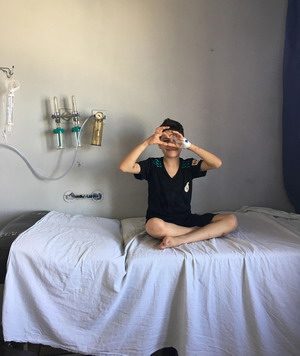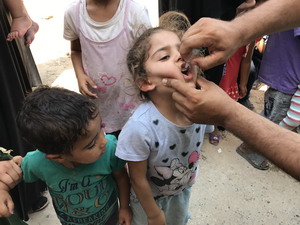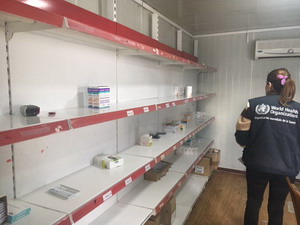 Baghdad 8 January 2019 – The World Health Organization (WHO) extends its gratitude to the US Department of State Bureau of Population, Refugees and Migration (BPRM) for the generous contribution of US$ 2.5 million to support the health security of Syrian refugees living in Iraq.
Baghdad 8 January 2019 – The World Health Organization (WHO) extends its gratitude to the US Department of State Bureau of Population, Refugees and Migration (BPRM) for the generous contribution of US$ 2.5 million to support the health security of Syrian refugees living in Iraq.
Iraq continued to host Syrian refugees throughout 2018. It is estimated that 250,000 Syrian refugees are currently residing in the three governorates of the Kurdistan Region of Iraq (KRI) - Erbil, Dahuk, and Sulaymaniyah. The majority (64%) live with the host communities.
“There is an urgent need to support local health authorities in KRI and ensure Syrian refugees have access to proper health services,” said Dr Adham R Ismail, Acting WHO Representative in Iraq.
“Providing comprehensive primary, secondary, referral and outbreak prevention and response services in the three refugee governorates is a WHO priority for the coming phase. It will indirectly improve the resilience of refugees and host communities against potential public health emergencies.”
Syrian refugees in Iraq have been given free access to primary health care services, through camp-based primary health care centres (PHCC) for refugees living in camps, and through specified public health facilities for those living with host communities.
These services are provided by the directorates of health in Erbil, Dohuk, and Suleimaniya, in collaboration with WHO and health partners. However, the mass internal displacement of over 3.3 million Iraqis in 2014 inflated demand for health care intervention and strained the ability of national health authorities and humanitarian partners to continue meeting the needs of refugees.
Since 2018 WHO has been active in filling the gaps in the supply of essential medicines and medical equipment, improving referral services, and supporting surveillance and water quality monitoring activities in refugee camps and in non-camp settings.
BPRM’s contribution of US$ 2.5 million will support the provision of comprehensive primary health care and referral services for 300 000 Syrian refugees and host communities in KRI. It will also support healthcare services for the disabled and mentally ill patients in the same areas through a comprehensive training programme for national professionals working in the mental health area.
The contribution will also cover the procurement and distribution of essential medicines, medical supplies and equipment to selected health facilities serving refugees in target governorates.
For more information, please contact:
Ajyal Sultany
WHO Communications Officer
(+964) 7740 892 878,
هذا البريد محمى من المتطفلين. تحتاج إلى تشغيل الجافا سكريبت لمشاهدته.
Pauline Ajello
WHO Communications Officer
(+964) 7510101460,
هذا البريد محمى من المتطفلين. تحتاج إلى تشغيل الجافا سكريبت لمشاهدته.
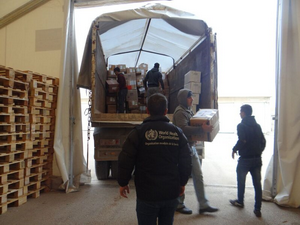 Shipment of emergency medical supplies to Syria8 January 2019 — WHO has airlifted 20 tons of medical supplies and equipment to Al-Qamishli in Al-Hasakeh governorate.
Shipment of emergency medical supplies to Syria8 January 2019 — WHO has airlifted 20 tons of medical supplies and equipment to Al-Qamishli in Al-Hasakeh governorate.




 Baghdad 8 January 2019 – The World Health Organization (WHO) extends its gratitude to the US Department of State Bureau of Population, Refugees and Migration (BPRM) for the generous contribution of US$ 2.5 million to support the health security of Syrian refugees living in Iraq.
Baghdad 8 January 2019 – The World Health Organization (WHO) extends its gratitude to the US Department of State Bureau of Population, Refugees and Migration (BPRM) for the generous contribution of US$ 2.5 million to support the health security of Syrian refugees living in Iraq.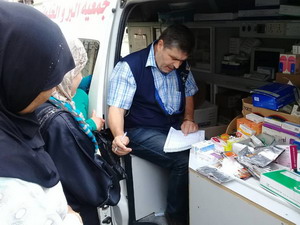 27 December 2018 – A generous donation from the Swedish International Development Cooperation Agency (SIDA) has enabled WHO to support medical teams in southern Syria. The teams provide primary health care services to thousands of people in the south who fled their homes in late June 2018 following an acute escalation of the conflict.
27 December 2018 – A generous donation from the Swedish International Development Cooperation Agency (SIDA) has enabled WHO to support medical teams in southern Syria. The teams provide primary health care services to thousands of people in the south who fled their homes in late June 2018 following an acute escalation of the conflict.